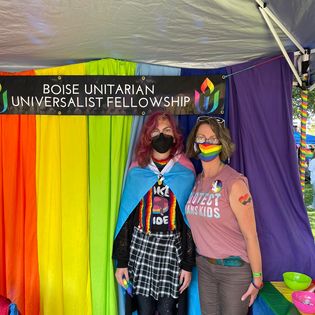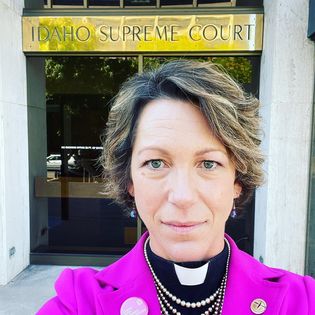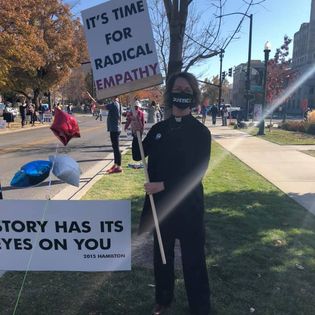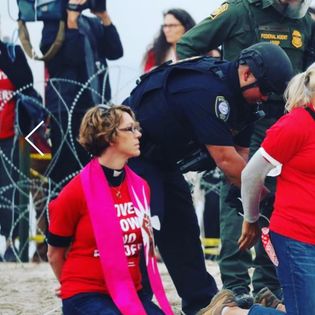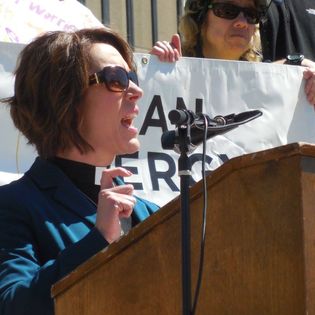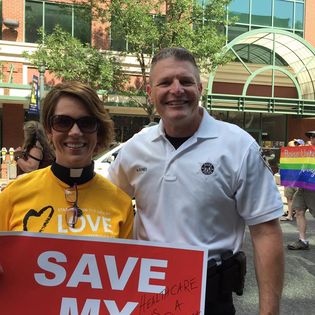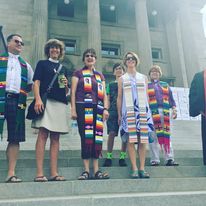Social Justice
"If I am not for myself, who will be for me? But if I am only for myself, who am I? If not now, when?" ~Hillel, Ethics of the Fathers, 1:14
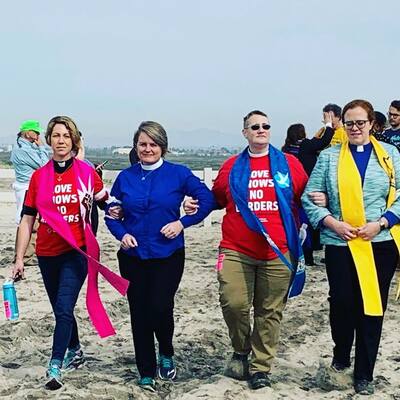
Growing up a child of professional parents, I was fortunate that both instilled in me a sense of service, justice, and civic mindedness. They taught me that participating in one’s community was valued; that using one’s privilege to help create a more just and peaceful world was part of what it meant to live a good life. As a result I have always held a deep, personal commitment to social justice in my life. I have always held a vision that our world can be a better place and that I must be a participant in making it so.
In my formation and church work, I have learned the power of stories, of telling my own story and of deeply listening to the stories of others. Stories matter. They take us under the surface; they crack open perceptions and stereotypes and help us see a multitude of perspectives. Stories connect us to our shared humanity, to our interrelatedness, creating space to tap into that deep neighbor love. Telling our own story is vital as well; vital to understanding our own lives in the context of others and vital in allowing room for others’ stories to weave with our own and make their mark, inhabit our worlds, and change our minds. Ministers have the great gift of lifting up stories. I take great care in using that gift.
I have learned that as members of the professional class we can use that role to be players in social change. We are often the influencers, those with connections to policy-makers and power-brokers. The danger, however, is to presume we know the “right” way toward change, continuing an abuse of power, imperialism, and marginalization. Instead, our role can be in lending our power to those who have little, standing in solidarity with instead of solidarity for an oppressed group, making space for them to lead the process toward a solution.
Doing work of justice, is messy and complicated. Along the way, we will inevitably stumble, fall, and fail. Accepting this truth can help orient us toward forgiveness, knowing how to notice those failures, fixing what we can, and getting back into the work. Dr. Sharon Welch, leading UU Ethicist, advocates a freedom to accept failure so that we will take risks and not allow ourselves to sit in the comfort of the way things have always been. She reminds us of the importance of sustaining the work, of not getting mired in despair of such that we think we cannot make a difference. She calls us to root ourselves in love and joy, “The ground of challenging injustice is gratitude, the heartfelt desire to honor the wonder of that which is; to cherish, to celebrate, to delight in the many gifts and joys of life.”
For me, justice work is holy, spiritual work because it asks us not just to imagine the possibilities of a better world, but also to be part of its ongoing creation. As UUs, we are called to honor many voices, faiths, experiences, and theologies, while finding ways to hold together and make it a joyful experience amidst the contradictions all of that brings. In fact this may well be our single most important religious task.
Some of the issues I have worked on over the years that have ignited my passion include: anti-racism and collective liberation; gun violence and common sense gun legislation; LGBTQ+ rights and Marriage Equality; reproductive rights and sexuality education; immigration reform, and economic justice.
Our world, our political environment offer us many opportunities to work for justice and be a liberal, religious voice for change. While congregations will no doubt have their own long-standing passions and projects, where there is committed leadership and vision, there is always room for more.
In recent years, one of the guiding forces in my approach to both justice work and leadership is author and movement builder/coach, adrienne maree brown. Her books have helped me engage more deeply in my individual work and my approach to organizational systems. I was so inspired by here work over the pandemic I authored and presented a paper for a UU Minister's Study Group (of which I am a member), focused on applying the Emergent Strategy principles in UU church work. CLICK HERE to read the paper.
In my formation and church work, I have learned the power of stories, of telling my own story and of deeply listening to the stories of others. Stories matter. They take us under the surface; they crack open perceptions and stereotypes and help us see a multitude of perspectives. Stories connect us to our shared humanity, to our interrelatedness, creating space to tap into that deep neighbor love. Telling our own story is vital as well; vital to understanding our own lives in the context of others and vital in allowing room for others’ stories to weave with our own and make their mark, inhabit our worlds, and change our minds. Ministers have the great gift of lifting up stories. I take great care in using that gift.
I have learned that as members of the professional class we can use that role to be players in social change. We are often the influencers, those with connections to policy-makers and power-brokers. The danger, however, is to presume we know the “right” way toward change, continuing an abuse of power, imperialism, and marginalization. Instead, our role can be in lending our power to those who have little, standing in solidarity with instead of solidarity for an oppressed group, making space for them to lead the process toward a solution.
Doing work of justice, is messy and complicated. Along the way, we will inevitably stumble, fall, and fail. Accepting this truth can help orient us toward forgiveness, knowing how to notice those failures, fixing what we can, and getting back into the work. Dr. Sharon Welch, leading UU Ethicist, advocates a freedom to accept failure so that we will take risks and not allow ourselves to sit in the comfort of the way things have always been. She reminds us of the importance of sustaining the work, of not getting mired in despair of such that we think we cannot make a difference. She calls us to root ourselves in love and joy, “The ground of challenging injustice is gratitude, the heartfelt desire to honor the wonder of that which is; to cherish, to celebrate, to delight in the many gifts and joys of life.”
For me, justice work is holy, spiritual work because it asks us not just to imagine the possibilities of a better world, but also to be part of its ongoing creation. As UUs, we are called to honor many voices, faiths, experiences, and theologies, while finding ways to hold together and make it a joyful experience amidst the contradictions all of that brings. In fact this may well be our single most important religious task.
Some of the issues I have worked on over the years that have ignited my passion include: anti-racism and collective liberation; gun violence and common sense gun legislation; LGBTQ+ rights and Marriage Equality; reproductive rights and sexuality education; immigration reform, and economic justice.
Our world, our political environment offer us many opportunities to work for justice and be a liberal, religious voice for change. While congregations will no doubt have their own long-standing passions and projects, where there is committed leadership and vision, there is always room for more.
In recent years, one of the guiding forces in my approach to both justice work and leadership is author and movement builder/coach, adrienne maree brown. Her books have helped me engage more deeply in my individual work and my approach to organizational systems. I was so inspired by here work over the pandemic I authored and presented a paper for a UU Minister's Study Group (of which I am a member), focused on applying the Emergent Strategy principles in UU church work. CLICK HERE to read the paper.
